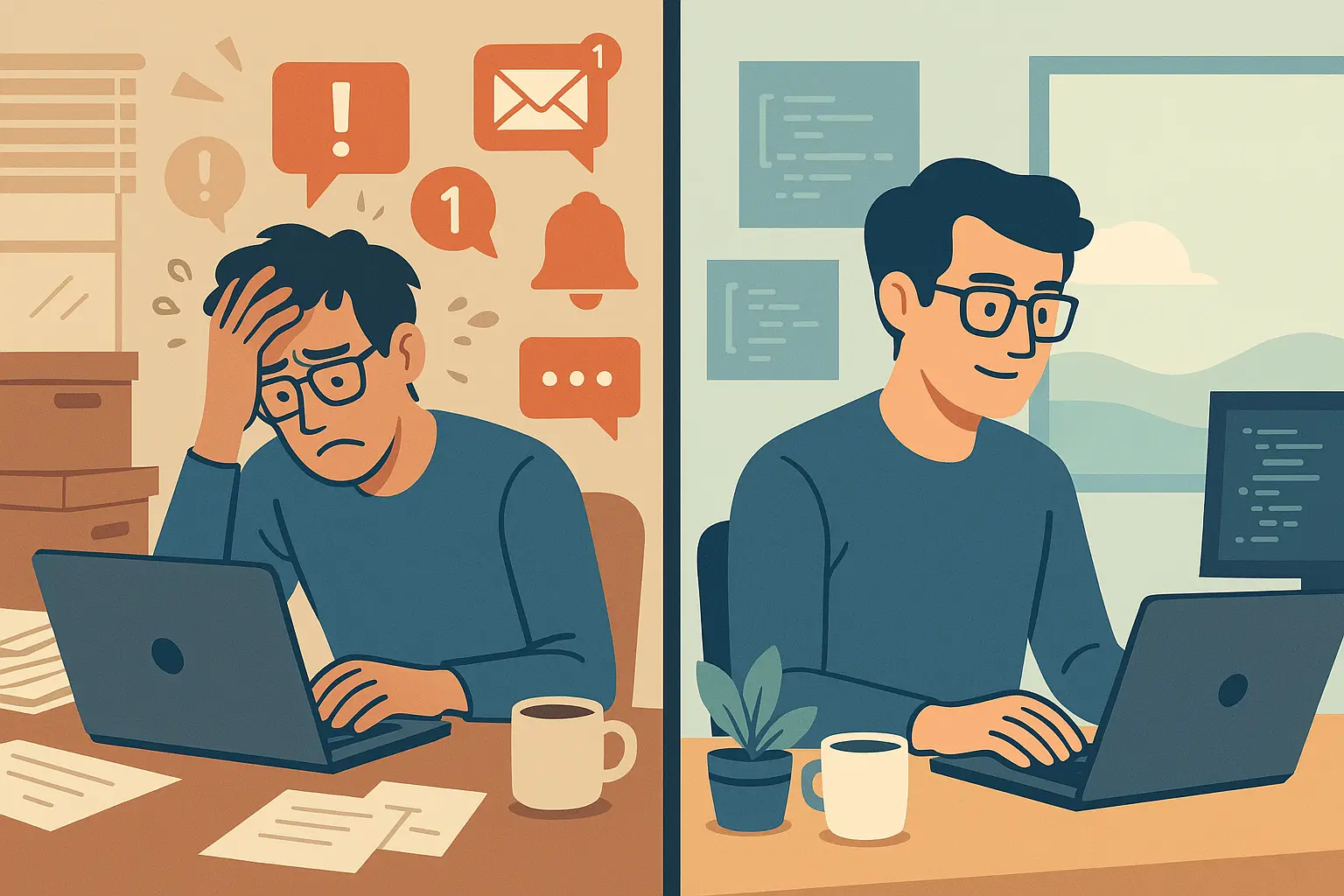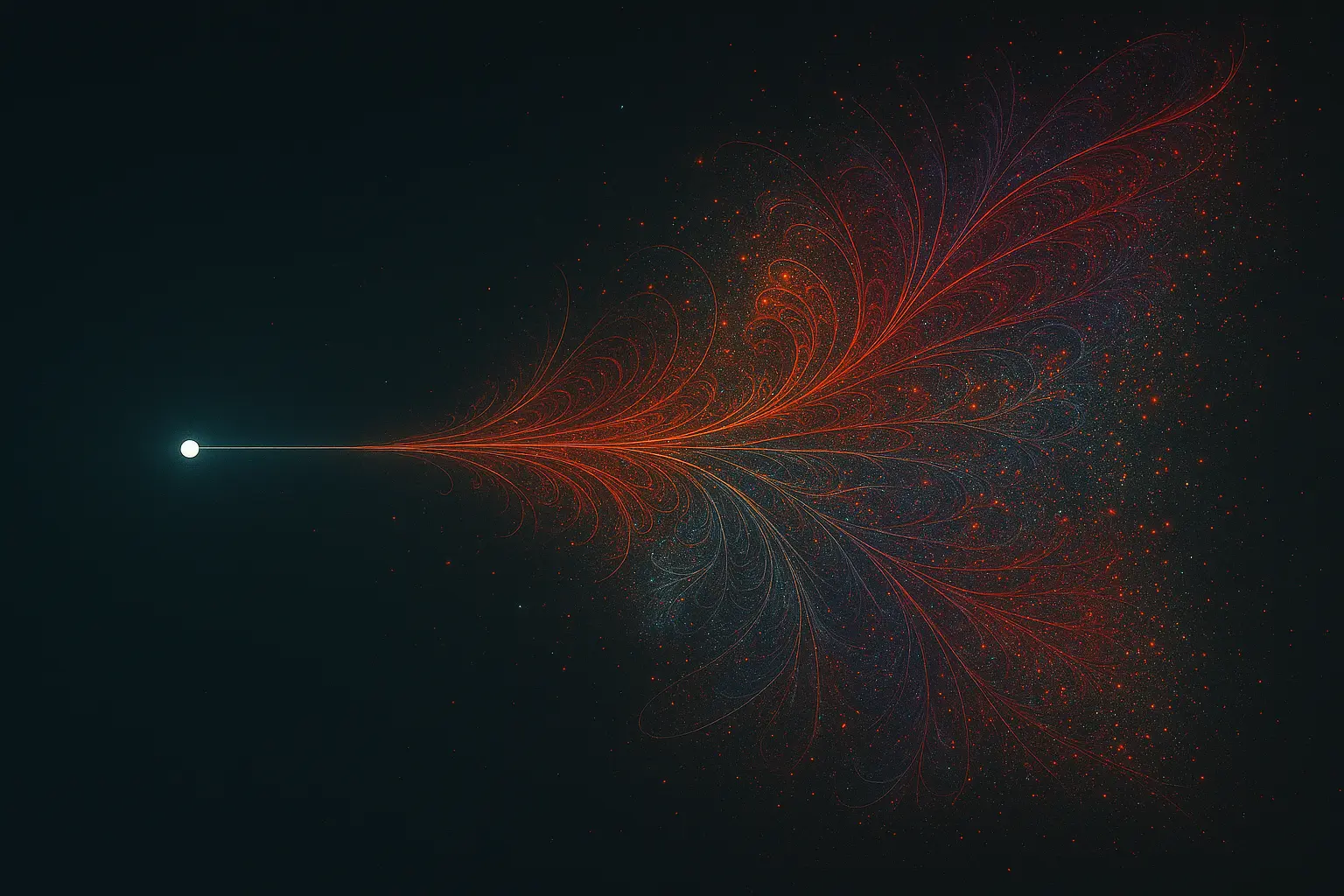Ever meticulously debugged a complex system only to find the root cause was something completely outside your initial assumptions? Or marveled at how a seemingly simple function call could cascade into a rich tapestry of emergent behaviors? As software engineers, we navigate intricate webs of cause and effect daily. It's led me to wonder: what if we applied that same analytical lens to ourselves, to our very sense of choice? It's a line of thought that makes me question if our cherished notion of free will might be more of an illusion than we commonly believe.
I've come to think that while the experience of making choices is undeniably real, these choices are profoundly shaped by a symphony of factors often playing just outside our conscious awareness. Think of it like legacy code – a new feature request (our "choice") isn't implemented in a vacuum; it's built upon layers of existing logic, past decisions (our biology and experiences), and environmental variables we didn't set.
The Algorithm of "Me": Is Free Will an Illusion?
I'm increasingly convinced by arguments, like those from neurobiologist Robert Sapolsky, that our brains, and thus our decisions, are sculpted by a lifetime of experiences and our underlying biology. This isn't to say our lived experience of choosing is invalid, but it reframes the origin of those choices. It feels less like a "ghost in the machine" independently pulling levers, and more like a highly complex algorithm executing based on its inputs and prior state. This perspective on determinism can feel a bit unsettling at first, kind of like realizing your elegant solution was actually dictated by the constraints of a poorly documented library. You can explore more about the ongoing discussion in the neuroscience of free will to see how deep this rabbit hole goes.
From "My Genius" to "Our Luck": A Personal Take on Determinism
My own journey with this idea has involved reflecting on past achievements. Instances where I initially attributed success solely to personal grit and talent later revealed a vast network of external support, privilege, and sheer luck. This resonates deeply within the tech world, doesn't it? How many of our projects succeed not just because of brilliant code, but because of a supportive team, a mentor's timely advice, or even a critical bug found by chance during a late-night coffee run? Recognizing this interconnectedness doesn't diminish achievement. Instead, it can bring a sense of humility and relief from the often-crushing burden of sole responsibility. It’s like realizing the success of a microservice isn't just its own code, but the entire ecosystem it operates within.
Beyond "Choice": Are We Just Reacting?
I find it increasingly accurate to view our actions not as "choices" but as "reactions." This shift in language is fascinating. It paints a picture of us as highly responsive systems, constantly reacting to internal states (our current thoughts, emotions, physical sensations) and external stimuli (the environment, social cues, incoming data). This view of choice vs. reaction aligns surprisingly well with event-driven architectures or reactive programming paradigms where components respond to incoming events rather than operating on a pre-defined, isolated volition. Our sense of self, then, becomes a kind of constructed narrative – a story we build to make sense of these reactions. The key is ensuring this narrative is helpful and adaptive, like a well-maintained README for our own operating system.
The Unfathomable Depth of Consciousness
Venturing into the mystery of human consciousness itself, I see it as an evolutionary marvel millions of years in the making. There's an inherent challenge in truly grasping the subjective experience of another being. It reminds me of Thomas Nagel's seminal 1974 philosophical essay, "What Is It Like to Be a Bat?", which explores these profound limitations. It's a bit like trying to understand a completely alien codebase written in a language you've never seen; you can analyze its structure, but the "qualia" of its execution remains elusive.
The Biochemistry of "Important"
Why does one bug feel critical while another seems trivial? It seems our perception of value is deeply tied to our biochemical states and contrasts – a biological machinery that assigns "importance." This system can be significantly altered, as evidenced by the effects of certain drugs, underscoring how much our reality is filtered through our internal chemistry. This reminds me of how a simple change in a configuration flag can alter a system's entire behavior and perceived priorities.
Willpower vs. Environment: The Power of Context
Here’s a big one for us developers: the immense power of context and choice. I believe changing your environment is often a more potent strategy for change than relying on sheer willpower. Think about it – how much easier is it to focus in a quiet library versus a noisy open office? Or to write clean code with good tooling and a supportive team versus fighting legacy systems alone? This challenges the "just try harder" narrative and points to the systemic influences on our actions, which has huge implications for the limits of willpower. It's about architecting our surroundings for success, much like we architect software systems for resilience and maintainability.

Changing one's environment can be a more effective strategy for personal change than relying solely on willpower. It's a thought that truly re-frames personal development.
Determinism Isn't Doom: The Open Future
It's crucial to distinguish determinism from fatalism. Just because our actions are influenced by a chain of prior causes doesn't mean the future is rigidly predetermined and knowable. The concept of chaos theory is enlightening here – even in deterministic systems, complex interactions can lead to emergent, unpredictable outcomes. Any software engineer who's dealt with distributed systems or complex algorithms has seen this firsthand: tiny initial changes can lead to vastly different results. The future remains an unwritten script, even if the actors follow certain rules.

In fact, managing complex distributed systems in software development often feels like a direct application of these ideas. We build systems with deterministic components, yet the sheer scale and number of interactions can lead to emergent behaviors that are incredibly difficult to predict with certainty. Instead of aiming for absolute predictability, which can be futile, we focus on building resilient systems – systems that can gracefully handle unexpected failures or states. This involves robust monitoring, good observability to understand what's happening, and designing for fault tolerance, acknowledging that not every eventuality can be known in advance. It's a practical acceptance of how deterministic rules can still yield a highly dynamic and not always foreseeable operational reality.
The "Us vs. Them" Bug: Understanding Tribalism
I've also thought a lot about our deep-seated tendency towards tribalism. This "us vs. them" mentality has biological and evolutionary roots, serving crucial roles in cooperation and group cohesion historically. However, in modern society, especially with the amplifying effect of social media (hello, echo chambers and social media!), this instinct can be easily manipulated, leading to division. We see it in tech debates (tabs vs. spaces, anyone?), but it has far more serious implications in broader societal contexts. Understanding its roots is the first step to debugging its more harmful manifestations.
Many of these tribalistic tendencies in our professional lives are amplified by common cognitive biases. For instance, confirmation bias might lead us to favor information that supports our preferred programming language or framework, while dismissing evidence for alternatives. In-group bias can make us overly critical of tools or practices adopted by "competing" teams or communities. Recognizing these biases is challenging because they operate subconsciously, but it's a vital step. By fostering an awareness of these mental shortcuts, we can encourage more objective technical discussions and build more collaborative team dynamics, shifting the focus from defending a chosen "tribe" to collectively finding the best engineering solutions.
Is Truth Relative? The Ever-Evolving Self
The idea that "truth" can be relative, dependent on our current state and experiences, is something I find increasingly compelling. Our perspectives are not static; they evolve. This aligns with how we grow as developers – what we held as "best practice" five years ago might be an anti-pattern today. It’s a call for intellectual humility and adaptability, an understanding that embracing complexity and nuance is part of the journey.
The Critical Need for a "Pause" Button
In our always-on, information-drenched world, I can't overstate the vital role of "pauses" for mental well-being. Practices like meditation or mindfulness aren't just buzzwords; they are practical tools to slow down the mental compiler, gain perspective, and manage the cognitive load. For those of us staring at screens, debugging logic, and juggling deadlines, this is less a luxury and more a necessity.
Beyond formal meditation, incorporating structured pauses into our workday can be transformative for developer productivity and mental clarity. Techniques like the Pomodoro Technique, which breaks work into focused sprints with short breaks, can help maintain concentration and prevent burnout. Similarly, being mindful of context switching – the cognitive cost of jumping between disparate tasks – and actively managing it by batching similar work or scheduling dedicated focus blocks can make a huge difference. Even simple micro-breaks, like stepping away from the keyboard for a few minutes each hour to stretch or look out a window, contribute significantly. These aren't just tricks to squeeze out more code; they are sustainable practices for long-term cognitive performance and overall well-being in a mentally demanding profession.
Embracing the Complex, Uncomfortable Truths
Ultimately, I believe there's courage in pursuing complex and nuanced truths, even when they challenge our comforting narratives. It’s about recognizing the validity of diverse human experiences and fostering empathy. For software engineers, who often seek clear-cut answers, this is a reminder that the human OS is far more complex than any system we'll ever design. Grappling with ideas around free will, determinism, and the neuroscience of free will doesn't mean we stop making decisions or striving for goals. Instead, it can lead to a more compassionate, less judgmental, and perhaps more effective way of navigating our lives and our work.
So, are we just running pre-written code? Maybe not entirely. But understanding the "runtime environment" and the "libraries" we're built with can certainly make for a more interesting and insightful execution.